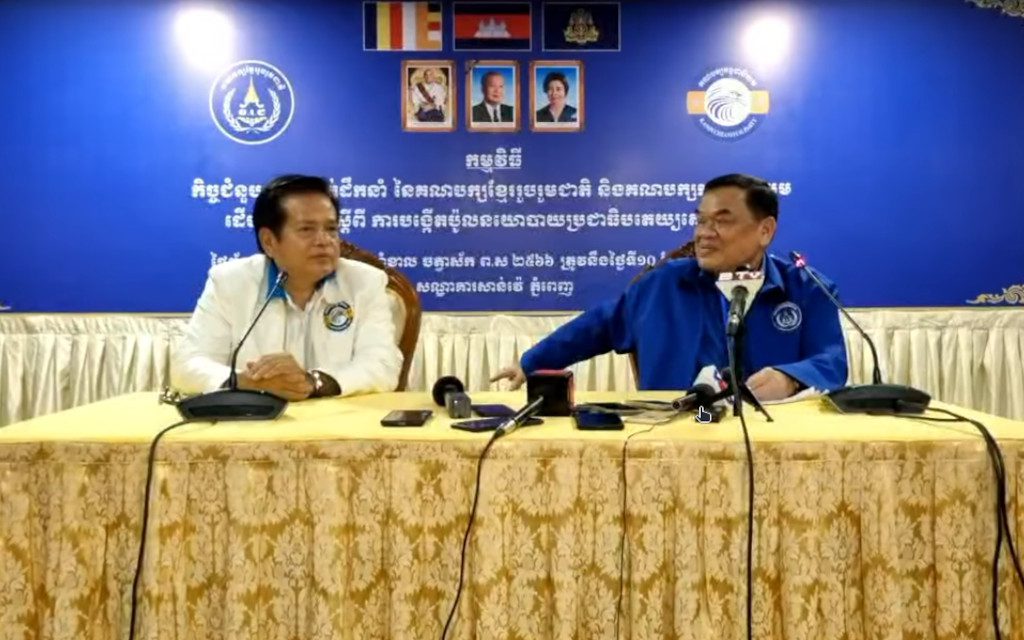Two minor parties will come together to form a new political “middle,” they announced on Monday, a surprise alliance between royalist general Nhek Bun Chhay and Yem Ponhearith, ally of on-trial opposition leader Kem Sokha.
In a press conference Monday, Bun Chhay’s Khmer National United Party and Ponhearith’s Kampucheaniyum said they had agreed to a cooperation based on seven principles, including participating in the 2023 national election under the KNUP banner and then forming a new merged party after the election.
Bun Chhay said the parties had similar policies in wanting to be neutral.
“My stance is the middle, the central democrats, meaning that I will not solely favor the right superpower and make the left one as the enemy,” he said.
Ponhearith said the two parties would initially run under the KNUP banner so they can quickly prepare for the next election. He also said his party had similar domestic and foreign policies as the KNUP, though he did not give any examples.
“The important thing is for the youth to take their turn to participate,” he said.
Ponhearith, an ex-CNRP lawmaker, was a senior member of CNRP leader Sokha’s former Human Rights Party. Kampucheaniyum had been in talks with different opposition parties — mostly also linked to the dissolved CNRP — over cooperation and National Election Committee reforms.
The KNUP had also been in alliance with two other parties — broadcaster Mam Sonando’s Beehive Social Democratic Party and Kuch Ly’s Khmer United Party — but said on Sunday it was withdrawing from that partnership.
Bun Chhay was formerly a general for the royalist Funcinpec party, which received the highest share of votes in the 1993 election, and he led the factional fighting in 1997 that is sometimes labeled a coup instigated by the CPP.
Loek Sothea, spokesman for the Grassroots Democratic Party, said his party had been cooperating with Kampucheaniyum on NEC reforms until Ponhearith recently went overseas over health issues.
“We are surprised to see him cooperate and unite with the Khmer National Unity Party because we thought that when he is back in the country, he will come back and talk again,” Sothea said.
Sothea said the GDP had spoken separately with both Kampucheaniyum and Khmer National Unity Party about an alliance two or three months ago.
The GDP, Kampucheaniyum and the Cambodia Reform Party — also formed by a Sokha ally, Ou Chanrath — had been working closely together, he said.
It was better for parties to merge to get away from the current political fragmentation, but voters had overwhelmingly followed the Candlelight Party as the opposition of choice in the June commune election. Candlelight, formerly the Sam Rainsy Party — the other faction that merged with Sokha’s Human Rights Party to form the CNRP — was a strong force and it would be difficult to move away from this current, Sothea said.
“People want to vote for any party that can win, meaning that they don’t want to vote just to vote because they have to take risks,” he said. “So if they choose to vote for a party outside the government, they will dare only for a party that has the possibility of winning.”
CPP spokesman Sok Eysan said he did not think the KNUP-Kampucheaniyum merger made any difference to his party’s dominance.
“The CPP has no worry or fear of this and that. We are very happy that they united together,” he said. “We are not narrow-minded about it, because we think that the Cambodian people across the country will still support the CPP.”












